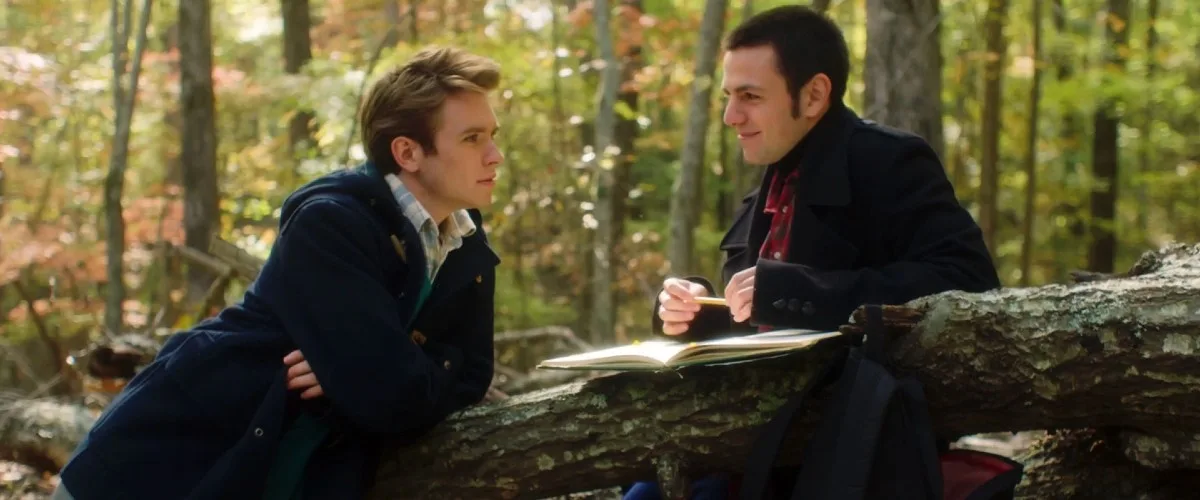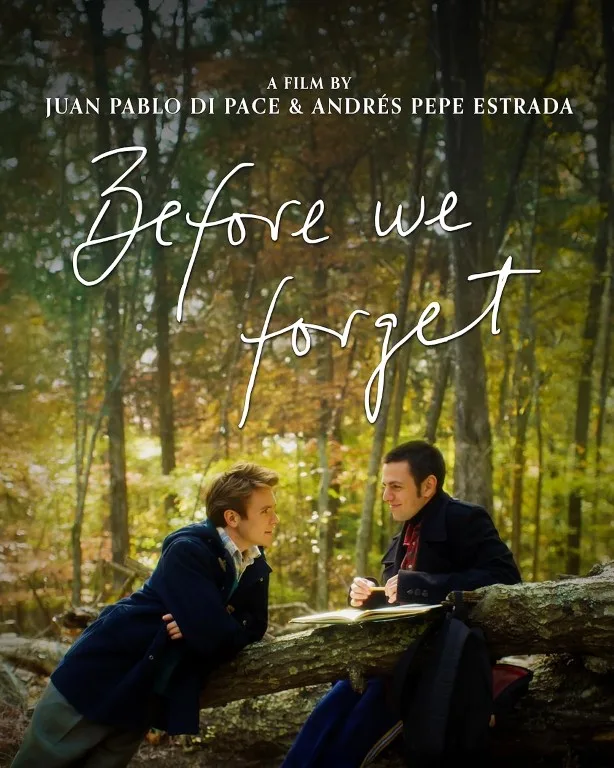Juan Pablo Di Pace’s movie about memory, longing, time, and family is like a set of Russian nesting Matryoshka dolls. The Argentinian co-writer, director, and star of “Before We Forget” has said that memories can be like scenes in a movie. That idea plays out in several ways in this film, inspired by his own memories of his first romantic crush and the lingering questions: Should I have said something? Did he feel the same way? Will I ever feel this intensely again?
Di Pace plays Matias, a movie director. We first see him on the final day of shooting, arguing with his producer about whether they can do one more take. Matias insists that they have to try it again, this time with the character based on him touching the face of the character based on the classmate he loved. The producer (Juan Cruz Márquez de la Serna as Paulo) points out that they are already six hours overtime and the crew will rebel if they keep them longer. Paulo insists that the take they have is perfect. It’s a wrap without the extra take that Matias wanted.
Matias tries to edit the film in time for a festival, but it is made more difficult because the images immerse him in the past. He tells Paolo, “I thought that working on it, [the memories] would lose intensity, but it’s the opposite.” We see the past reflected in three different ways. There are flashbacks, with Santiago Madrussan as the young Matias and Tomás Kirzner as young Paulo, brief glimpses of the movie within the movie as present-day Matias is editing it, and home movies Paolo shot when he visited Matias in school. These last images are, in the world of the movie, “real” in a way that memories and re-creations are not. Can Matias see something in those movies taken 23 years ago that he could not see at the time? (For one more layer, watch the end credits to see the real home movies of Di Pace’s college friends.)
We first see the young Matias in Italy, riding in a comfortable van on his way to the United World College of the Adriatic, an international school. He is shy compared to the arty extroverts who swarm out to welcome the newcomers. The upper class puts on a talent show. Matias is reluctantly pulled on stage and told to demonstrate the signature dance of his home country. Encouraged by the audience, he leads one of the performers in a tango, and the crowd cheers in approval. Afterward, a handsome and charming Swedish student named Alexander (Oscar Morgan) calls Matias “Fred Astaire” and says, “I need to be your friend.”
In the grand tradition of Brideshead Revisited and perennial if not universal freshman heartbreak, Matias is enthralled with Alexander. He is enchanting: rich, a bit spoiled, funny, bright, and impulsive, with artfully tousled blonde hair, always up for a good time or a great story. Matias barely understands his desires and cannot assess or explore whether Alexander wants just friendship or might be interested in exploring a romantic relationship.
And then, after a foolish prank, Alexander is expelled and returns to Sweden. He sends Matias an invitation to visit his family for Christmas, with money for the plane fare. Alexander’s parents welcome him warmly, and Alexander’s beautiful sister Katherine (Julia Bender) has a crush on him. Is Alexander’s new coolness a sign of nerves about having to leave for military school in the new year, or might he be jealous?
In the present day, Katherine (Krista Kosonen) urges Matias to attend her wedding, telling him he will see Alexander, his first time seeing either of them in more than 20 years.
The adult Matias is confused and stressed, but Di Pace conveys those feelings with an appealing natural warmth and good humor, as he has shown in Hallmark movies and as Fernando on “Fuller House.” Morgan is excellent as the young Alexander, whose vulnerability and impetuousness are more evident to us than to his classmates. As the mothers of Matias and Alexander, González and Sarah Parish deliver performances of great depth that enhance our understanding of their sons.
Di Pace shares writing, directing, and editing credit with his real-life Paulo, Andrés Pepe Estrada, and they make some evocative choices to keep the focus more on mood than storyline. Matias rides in near-identical vans in the past and present. The invitations Matias receives from Alexander and Katherine, separated by more than two decades, are on the same stationery with a drawing of the family’s home. The home itself has remained almost unchanged throughout the years. These all underscore the way current perception colors memories of the past. And they symbolize the difference between accuracy and truth, between reporting what happened and understanding what happened.
There is also a contrast between the confusion Matias experiences in both the past and present and the extraordinary scene of apology and acceptance between Matias and his parents (Araceli González and Fabián Mazzei) as they leave Alexander’s family after the Christmas visit. A present-day scene with Matias and his mother is brimming with a richness of support and security we do not see in his relationships with Alexander or Paolo, or with a one-night stand whose name he cannot quite recall.
The film hurries a bit too much near the end, as though it was edited too quickly by Matias with the deadline nearing after he spent too much time pondering his memories. The scene that Matias was unable to include in his film would have shown his younger self touching Alexander’s face, something he failed to do when they were students. Finding a way to create that moment for the film we see is a moment of grace that unites memory and understanding.




















